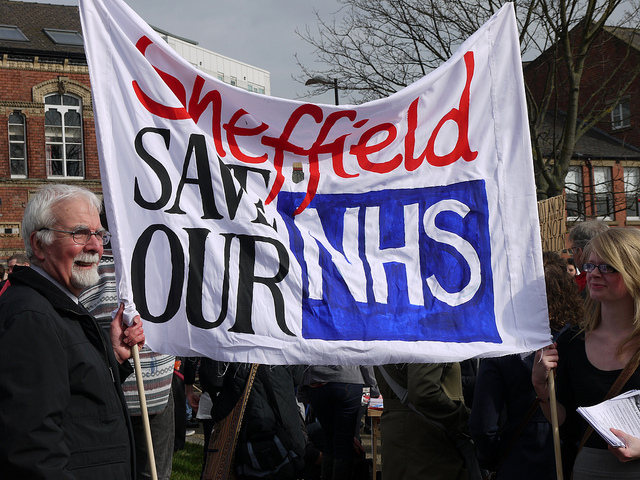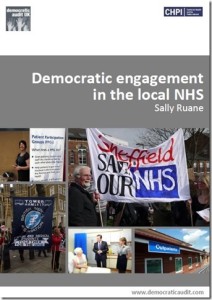Expanding the resources and powers of Healthwatch and Overview & Scrutiny Committees would improve the local accountability of health services
Unlike many other public services, the NHS is not subject to local democratic control. In this post – a second extract from Democratic Audit’s new ebook – Sally Ruane examines the barriers to local democratic engagement in the NHS, and identifies ways to improve accountability through local authorities and Healthwatch.

What influence do communities have over their local NHS services? Credit: Philippa Willitts, CC BY-NC 2.0
Barriers to democratic engagement
There are numerous barriers to democratic engagement in health services. One concerns the scepticism with which citizens may approach engagement in formal involvement mechanisms. For example, a frequent complaint surrounding local consultation exercises is that local managers have made their decisions prior to the consultation.
Second, bodies charged with championing the patient and public interest have typically in recent years had weak powers. Healthwatch, for example, has no right to compel the directors of relevant institutions to attend meetings and answer questions. This lack of powers pushes the organisation to see representation and championing as a matter of technical and procedural accomplishment rather than as a political process characterised by tension, negotiation or conflict between counterposing powers over differences in values and interests and competition over resources. These organisations might even pride themselves on being studiedly apolitical. This can reinforce a view that involvement is intended to be carefully managed.
Third, would-be participants can find themselves swamped by the complexity and sheer scale of organisational structures and processes. This is compounded by repeated restructuring in which it takes months or even years for those working within the system and other experts (never mind patients and citizens) to comprehend new processes, functions and relationships and a changed distribution of resources. Alternatively, participants can get bogged down in involvement processes focused on the details of implementation and lose sight of the overall direction of local or government driven policy.
On a more practical level, some of the involvement mechanisms, such as local authority or clinical commissioning group (CCG) meetings, whilst held in public, take place during the working day. Business is conducted in an arcane language, incomprehensible to many people, and documented on an industrial scale. Documents for some Trust meetings can run into hundreds of pages. Even briefer documentation can cover complex issues and be presented in a way which makes it difficult or impossible for those outside the organisation to follow and interpret.
The challenge of navigating this vast and difficult terrain – with documentation for some meetings sometimes released only one week in advance – can be even more off-putting if the would-be participants suspect official documents are deliberately used to hide information which local managers and decision-makers would prefer not to be noticed. As is the case across public services more widely, members of the public must also grapple with technical details which often in modern governance become central to arguments designed to justify certain policy preferences. For instance, technical arguments based on specialist knowledge feature prominently (and sometimes inaccurately) in arguments surrounding proposed service reconfigurations (e.g. the argument that bigger, fewer units will produce better outcomes).
Finally, in some respects the big bang system reform enshrined in the 2012 Health and Social Care Act with the dramatic extension of the market model, itself and at a very fundamental level, undermines the abilities of citizens to hold health service providers to account. An increasing portion of health services will be provided by commercial providers who are not required to answer information requests under the Freedom of Information Act and whose NHS clients are not protected by human rights legislation. It will also be difficult for the public to keep up with which organisation has which contract, which contracts are up for tender, and what precisely different companies and third sector organisations are providing.
Furthermore, it will be an arduous matter to hold the relevant public commissioning authority to account for services they no longer deliver. This is likely to become all the more complex under the new principal contractor – subcontractor model whereby a large contract for NHS services is signed with a single provider which can then sub-contract to other providers. Again, these difficulties will be encountered in other public service sectors where comparable market policies are being implemented.
Genuine successes in local democracy – overview and scrutiny
If we consider where democratic engagement might be real and effective, it is in the local authority that perhaps the greatest potential for genuine citizenship influence over decision-making is to be found. Local authority committees include and are chaired by locally elected councillors. The health overview and scrutiny committees (OSCs) were established following the Local Government Act of 2000 and took on the function of scrutiny and the powers to consult previously held by Community Health Councils (CHCs). Currently these committees typically embrace scrutiny of social care as well.
Although variable in effectiveness, OSCs have become particularly significant in relation to controversial local, regional or national plans to reconfigure health services, especially where local services are threatened with closure. As well as responding to NHS consultation exercises, citizens individually – but, more effectively, collectively through campaigning – have been able to ensure their views are heard by addressing their concerns to the OSC. OSCs have the power to require health service managers to supply information and to account for their proposals and decisions and for their provision and they also have the power to refer key decisions about substantial health service changes to the Secretary of State for review (another power inherited from CHCs). In the case of the reorganisation of children’s heart surgery across England, for example, this power has had a major impact in halting the proposed changes.
Changes introduced under the coalition government (section 190 of the 2012 Health and Social Care Act) expand the remit of OSCs to encompass independent sector providers which are equally (with public providers) required to provide information, attend meetings, answer questions and consult when substantial changes to health services are proposed. The changes also transfer both the duty of scrutiny and the power to refer to the council as a whole. This means that a larger group of people would need to be convinced of the benefits of a referral – but also that any referral made would carry greater legitimacy. Any campaign which hopes to succeed in halting unpopular reconfiguration proposals must expect to have to convince the OSC first. The establishment of an Independent Reconfiguration Panel in 2003, charged by the Secretary of State to review contested proposals, gives citizens a third opportunity to ensure their views are heard. There are some important caveats: legislative changes have raised the bar in terms of the criteria the OSC must consider before referring a decision to the Secretary of State and the impact of these is yet to be seen. Of course, the extent to which OSCs and council chambers as a whole are minded to support local opponents of reconfiguration decisions is likely to be shaped to some extent by party political matters as well as local sentiment and the wider prevailing debate.
Overall, I would see OSCs as one of the few elements of public engagement in the health system which really has teeth – that is, where citizens have, under certain circumstances, been able to shape important decisions (e.g. where campaigners halted plans to downgrade Horton General, Banbury, in 2008). This space is created partly through exploiting local political tensions and partly through the distance that local councillors have from the NHS itself. Perhaps the more the perspectives of councillors and NHS senior personnel converge, the greater the likelihood that this space for effective lobbying by organised citizens will shrink.
It remains to be seen whether the other key local authority committee, the Health and Wellbeing Board, is able to offer the same potential. It may be that precisely as greater responsibility for health transfers to local authorities, the more local councils will be tempted to ignore, defuse or re-route rather than champion local opposition to health service decisions. Health and Wellbeing boards include in their membership senior personnel from NHS commissioning organisations and social care services, so the critical scrutiny perspective of OSCs will not be replicated exactly. On the other hand, councillors may on occasion see political capital in responding to local concerns.
Strengthening local democracy in health?
Local democracy in health could be strengthened through reducing the scope of the ‘exempted information’ which public and private organisations are not required to give to the OSC (Schedule 17 of the 2006 NHS Act). This includes information which could be described as ‘commercially sensitive’ such as the value and terms of contracts to provide services. This constitutes precisely the sort of information in which local citizens could legitimately expect to have an interest given that public services and public funds are at stake.
Democracy could also be strengthened through enabling local Healthwatch to plan for an adequate programme of work by good funding levels and through extending its powers to enable it to compel personnel from any local health and social care organisation (public, third sector and private) to attend meetings and answer questions. Perhaps above all Healthwatch needs to develop a robust culture in which it is prepared to criticise and challenge NHS bodies, providers and the Health and Wellbeing Board vociferously if needed. It is difficult to see how this last can be achieved whilst Healthwatch continues to be contracted by the local authority since a Healthwatch which challenges the functioning of the local health service could find itself branded as troublemaking and its contract unrenewed.
–
This post is an extract from Democratic Audit’s new ebook, Democratic engagement in the local NHS, which includes further analysis from Dr Ruane of the reforms of patient and public involvement structures in the NHS over recent years.
Note: this post represents the views of the author and does not necessarily give the position of Democratic Audit or the LSE. Please read our comments policy before commenting. Shortlink for this post: buff.ly/1eEp99a
–
 Dr Sally Ruane is the Deputy Director of the Health Policy Research Unit at De Montfort University, Leicester and a member of the Centre for Health and the Public Interest’s executive management team. She has published in books, academic journals and magazines in the UK and Spain and has a particular interest in the private finance initiative, service configuration and political aspects of the policy process.
Dr Sally Ruane is the Deputy Director of the Health Policy Research Unit at De Montfort University, Leicester and a member of the Centre for Health and the Public Interest’s executive management team. She has published in books, academic journals and magazines in the UK and Spain and has a particular interest in the private finance initiative, service configuration and political aspects of the policy process.






 Democratic Audit's core funding is provided by the Joseph Rowntree Charitable Trust. Additional funding is provided by the London School of Economics.
Democratic Audit's core funding is provided by the Joseph Rowntree Charitable Trust. Additional funding is provided by the London School of Economics.
Expanding the resources and powers of Healthwatch and Overview & Scrutiny Committees would improve accountability https://t.co/zXm7llEAgt
@HSJnews Democratic Audit has published new analysis of accountability mechanisms in the NHS – need strengthening https://t.co/oBppa2urzn
@SocietyGuardian Democratic Audit’s new analysis of accountability in the NHS and barriers to public involvement https://t.co/Okt2ASLNz6
Hello @NHAparty thought you’d be interested in Democratic Audit’s new analysis of accountability in the NHS https://t.co/RUTWeJgjjg
Expanding the resources and powers of Healthwatch and Overview & Scrutiny Committees would improve the local acc… https://t.co/UHmbIRUb1m
How do we improve accountability in the NHS? Sally Ruane has some answers https://t.co/Pl8GfwVhc0
With more powers, Healthwatch and Overview & Scrutiny Committees would improve the local accountability of the #NHS https://t.co/2pu7qZvyuc
Expand resources and power of Healthwatch and Overview & Scrutiny Committees to boost local accountability of NHS https://t.co/DIqaI2cYeM